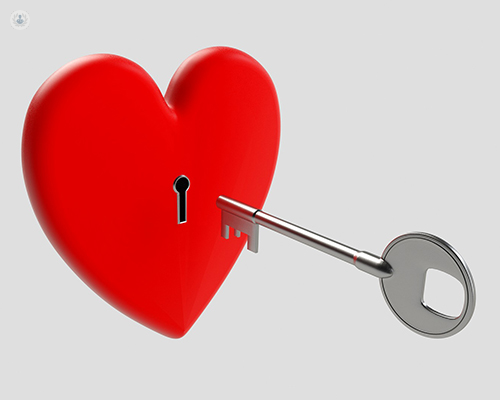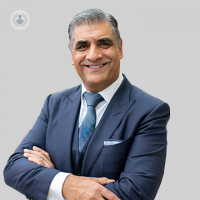Surgeons now have the key to your heart: Keyhole heart surgery
Written in association with:Undergoing heart surgery is a massive ordeal for the body to go through. More recently, some surgeons have been able to treat the heart through smaller access for the same procedures, known as keyhole heart surgery. An expert in this treatment, consultant cardiothoracic surgeon Mr Inderpaul Birdi delivers essential information regarding keyhole heart surgery in this article.

What is keyhole heart surgery?
Traditional heart surgery is performed by making a cut in the breastbone called a median sternotomy. It is a very effective way for the surgeon to get to the heart and treat various heart conditions like aortic valve stenosis (calcified aortic valve), mitral valve regurgitation (leaking mitral valve), bypassing blocks in heart arteries, or dealing with aneurysms of the aorta.
The only problem with the breastbone cut is that it is a big cut, which means it takes a long time to heal—roughly three months. During that healing period, patients have to be careful about what they do. For the first six weeks they can only lie on their back when they sleep; they cannot lie on their side. For three months they need to avoid heavy lifting, which means that they cannot get back to their normal life for a long time.
Over the last 18 years, my team at The Keyhole Heart Clinic have been performing minimally invasive heart operation procedures both safely and effectively. These procedures are the same heart operations that you would have received through the breastbone, but instead we use keyhole approaches. We can make a small cut between the ribs on the right-hand side, for example, to repair or replace the aortic valve. We can make a small cut underneath the right nipple of a man or underneath the breast of the lady to repair or replace the mitral valve and perform heart rhythm treatments, like the ablation of irregular heartbeats (atrial fibrillation). We can make small cuts over the left chest to bypass heart arteries, not just one or two, but even three heart artery blocks.
The important feature about keyhole heart surgery is that it offers smaller cuts, but more importantly, cuts that do not hurt so much and heal in six or seven days. We know from widely published evidence in the literature globally that these cuts are associated with less risk of bleeding and less risk of infection when compared to the breastbone. If you have an experienced team who are offering you keyhole heart surgery, then it is very likely that you will receive a better and quicker outcome from that treatment than if your surgery was performed through the breastbone. Inexperienced teams should not perform keyhole heart surgery until they have been trained. This training does take a long time, and this is the main reason why keyhole heart surgery is not widely practised.
Who is suitable for keyhole heart surgery?
Many patients come to see me for consideration of keyhole heart surgery. The good news is that many of those patients are suitable for the procedure. It is very important to make a very careful assessment of each patient individually. We do that by simply reviewing the tests that you may have had done in your own local hospital and perhaps add one or two very simple tests that will allow us to know whether it is going to be both safe and effective. By effective, I mean we never want to perform keyhole heart surgery that will give us a less superior outcome than traditional heart surgery. We want to be able to do exactly what you would have had performed through the breastbone but perform it through the keyhole. The reasoning is we know those treatments have good immediate, intermediate, and long-term results—both in terms of the way you will feel and how long you will live.
Is keyhole heart surgery safe?
Keyhole heart surgery, when performed by experienced surgeons and teams, is extremely safe. The key issues in making that determination lie really with the team in deciding the following:
- Are you suitable for the procedure?
- What treatment will be delivered?
- Can that treatment be delivered as effectively through the keyhole as it can through the breastbone?
Generally, if patients come to our clinic and we find them suitable for keyhole heart surgery, they will be offered a lower risk of surgery with the keyhole. There is less risk of infection, less risk of bleeding, much less pain, and much more swift return to normal activities. There’s no doubt that if we see patients who are suitable for keyhole, we will recommend it strongly as a treatment of choice.
The National Institute of Clinical Excellence (NICE) recently published a very important new guideline in November 2021 which indicates that patients who have aortic valve stenosis or mitral valve disease and are suitable for keyhole heart surgery or express a preference for keyhole heart surgery should not be declined access to keyhole just because local expertise does not exist. This document will empower patients to be able to request referral to experts who perform keyhole heart surgery and most doctors are now recognising that in the correct patients, keyhole heart surgery is an excellent treatment.
What are drawbacks to keyhole heart surgery?
There are two main drawbacks:
- Keyhole heart surgery needs to be performed by experienced teams. The team at The Keyhole Heart Clinic have been performing keyhole heart surgery for over 18 years and on nearly a thousand patients. If your surgeon is not experienced at keyhole heart surgery, then you should be referred to a centre with expertise in such procedures.
- Keyhole heart surgery is always associated with a small risk of conversion to the breastbone, even with an experienced team. This means that your surgeon may start with keyhole, but at some point during the procedure convert to the traditional breastbone. This allows us to keep the operation safe at all times and to make sure we maximise the outcome of your surgery.
At the end of the day, these are the two main features upon which we concentrate when delivering surgery for your underlying problem.
How do patients find out more about keyhole heart surgery?
If you would like to find out more about keyhole heart surgery, visit The Keyhole Heart Clinic webpage. There's lots of information there for you to read and pamphlets that you can download that allow you to prepare for heart surgery, whether it's with us or with your local team. Additionally, there are some wonderful videos from myself and my colleagues that will allow you to understand better valve choices if you need an aortic valve replacement or a mitral valve repair. Some wonderful patient experience stories can be found on the website, as well. I think that they are really helpful for you if you are preparing for heart surgery, because they will allow you to develop the confidence that you need to know that heart surgery is safe, very effective, and you can live a perfectly normal life after your treatment has been complete. In addition to that, if you want to know more about me specifically, visit my Top Doctors profile and hopefully you will learn all you need to know about the work that we do.
If you are considering having a heart procedure and would like more information about your options for keyhole heart surgery, you can book a consultation on Mr Birdi’s profile.


